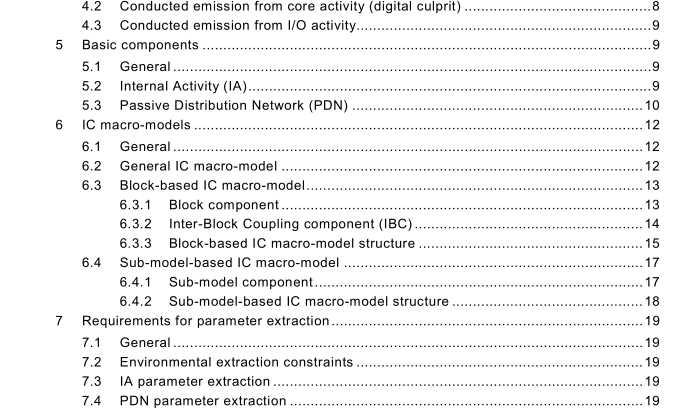IEC 62433-2:2008 pdf download – EMC IC modelling – Part 2: Models of integrated circuits for EMI behavioural simulation – Conducted emissions modelling (ICEM-CE)
This part of lEC 62433 specifies macro-models for lCs to simulate conducted electromagneticemissions on a printed circuit board. The model is commonly called Integrated CircuitEmission Model – Conducted Emission (ICEM-CE).
The ICEM-CE model can also be used for modelling an lC-die, a functional block and anlntellectual Property block (IP).
The ICEM-CE model can be used to model both digital and analogue lCs.
Basically, conducted emissions have two origins:
conducted emissions through power supply terminals and ground reference structures;
conducted emissions through input/output (l/O) terminals.
The lCEM-CE model addresses those two types of origins in a single approach.
This standard defines structures and components of the macro-model for EMl simulationtaking into account the lC’s internal activities.
This standard gives general data, which can be implemented in different formats or languagessuch as lBIS,IMlC,SPICE,VHDL-AMS and Verilog. SPICE is however chosen as defaultsimulation environment to cover all the conducted emissions.
This standard also specifies requirements for information that shall be incorporated in eachICEM-CE model or component part of the model for model circulation, but description syntaxis not within the scope of this standard.
2Normative references
The following referenced documents are indispensable for the application of this document.For dated references, only the edition cited applies. For undated references, the latest editionof the referenced document (including any amendments) applies.
IEC 61967 (all parts),Integrated Circuits – Measurement of electromagnetic emissions,150KHz to 1 GHz
IEC 61967-4,Integrated circuits – Measurement of electromagnetic emissions,150 kHz to 1GHz – Part 4: Measurement of conducted emissions – 1 Q/150 Q direct coupling method
3Terms and definitions
For the purposes of this document, the following terms and definitions apply.
3.1 external terminal terminal of an IC macro-model, which interfaces the model to the external environment of the IC, such as power supply pins and I/O pins NOTE In this document, the name of each external terminal starts with “ET”.
3.2 internal terminal terminal of an IC macro-model’s component, which interfaces the component to other components of the IC macro-model NOTE In this document, the name of each internal terminal starts with “IT”.
4 Philosophy
4.1 General Integrated circuits will have more and more gates on silicon and technical progress will develop faster. To predict the electromagnetic behaviour of equipment, it is required to model the switching of the input and output interface and the internal activities of an integrated circuit effectively. Figure 1 depicts an example of decomposition of an IC to enable conducted emissions analysis. The internal digital activity (culprit) is a source of electromagnetic noise that originates in switching of active devices. The coupling path propagates the emissions to the IC’s external terminals: pins/pads. The coupling path is the power distribution network or I/O lines inside the IC.
4.2 Conducted emission from core activity (digital culprit) The current transients are created in the core area on the IC-die. Due to the characteristics of the digital coupling paths, the passive distribution network on printed circuit board (PCB) and the availability of on-chip decoupling, a portion of these current transients will occur at the power supply pins of the IC.
NOTE These off-chip power supply currents can be measured according to the IEC 61 967 series.
4.3 Conducted emission from I/O activity
I/Os activities may create voltage fluctuations of power and ground levels, and conducted emissions appear at power and ground pins through the I/Os’ coupling path. And the output signals at output pins themselves are sources of conducted emissions to the printed circuit boards.
NOTE The measurement set-up is done according to the IEC 61 967 series.
5 Basic components
5.1 General
The basic components are component parts of the IC macro-model or block component or sub-model component. The following subclauses define the basic components.
NOTE The block component and the sub-model component are defined in Subclause 6.3.1 and 6.4.1 respectively.
